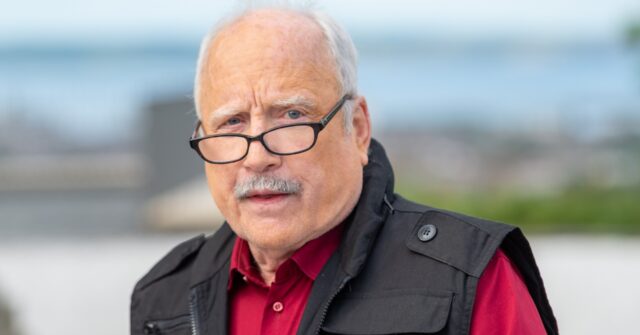Hollywood’s new diversity inclusion standards are “thoughtless” and “patronizing,” Richard Dreyfuss said in an interview Friday. The Jaws star further claimed the new eligibility standards “make me vomit” as he defended Laurence Olivier’s 1965 “blackface” rendition of Shakespeare’s Othello.
In an interview on PBS’s Firing Line with Margaret Hoover, Dreyfuss sat down to discuss America’s “civics crisis” while weighing in on the Academy of Motion Pictures’ diversity inclusion standards which will require films to meet standards in representation categories to qualify for the Best Picture category starting from the 96th Oscars in 2024.
Asked what he thought of the new standards which are to go into effect next year, the Oscar-winner, who claimed to “really love being an American,” bluntly expressed his dismay.
“They make me vomit,” he replied.
“I think we’re in the endgame right now.”
Actor @RichardDreyfuss discusses restoring civics education and his fears for the nation’s future. Plus, he reacts to Hollywood’s new inclusion standards: “They make me vomit.”
TONIGHT 8:30 pm ET@PBS listings: https://t.co/yjV9uYyL5J pic.twitter.com/njuxohjD5d
— Firing Line with Margaret Hoover (@FiringLineShow) May 5, 2023
When questioned why, Dreyfuss explained art shouldn’t be governed by the latest “moral” fad.
“Because this is an art form,” he said. “It’s also a form of commerce, and it makes money, but it’s an art.”
“And no one should be telling me as an artist that I have to give in to the latest, most current idea of what morality is,” he added.
He also argued one cannot “legislate” over the perceived slighting of others.
“And what are we risking? Are we really risking hurting people’s feelings? You can’t legislate that. And you have to let life be life,” he said.
PBS promises to get more woke! https://t.co/1KGGcr1ZL5
— Breitbart News (@BreitbartNews) August 15, 2021
“And I’m sorry, I don’t think that there is a minority or a majority in the country that has to be catered to like that,” he added.
Referencing the classic 1965 film Othello, which featured legendary actor Sir Laurence Olivier with darkened skin playing the title role, Dreyfuss commended Olivier’s “brilliant” performance.
“Laurence Olivier was the last white actor to play Othello, and he did it in 1965. And he did it in blackface. And he played a black man brilliantly,” he said, as he asked: “Am I being told that I will never have a chance to play a black man? Is someone else being told that if they’re not Jewish, they shouldn’t play the Merchant of Venice?”
“Are we crazy? Do we not know that art is art? This is so patronizing,” he added. “It’s so thoughtless, and treating people like children.”
The British film, starring Oscar nominees Laurence Olivier, Maggie Smith, Joyce Redman, and Frank Finlay, has been the subject of controversy.
In 2021, a China-born music professor at the University of Michigan was forced out of teaching a Shakespeare class — and reported to the Office of Equity, Civil Rights, and Title IX — after showing the classic Othello to his class, which included students offended by Olivier’s darkened skin.
Asked if there’s a “difference between the question of representation and who is allowed to represent other groups… and the case of blackface explicitly in this country given the history of slavery and the sensitivities around Black racism,” Dreyfuss said, “There shouldn’t be… because it’s patronizing.”
“It says that we’re so fragile that we can’t have our feelings hurt. We have to anticipate having our feelings hurt, our children’s feelings,” he added. “We don’t know how to stand up and bop the bully in the face.”
Hoover pressed on, questioning the Mr. Holland’s Opus actor over whether there is a “fuller version of our history that is perhaps more inclusive to the diversity of the country now” when telling stories of our past.
“I once worked for a guy who was making a film about the gangsters of the thirties,” he replied, “and I said, ‘Why did you change this incident and that incident from the reality? Because the reality was so much more interesting than what you created, and by changing it you made it simple and smaller.’”
“I totally believe that you can make a great film or a great painting or a great opera out of the truth first,” he added. “Try that first. And then if you can’t do it, then make up some nonsense. But don’t tell me you can’t do that [or] that history isn’t that interesting.”
The Academy of Motion Picture Arts and Sciences announced in 2020 that, starting in 2024, it would require films to meet extensive “diversity” standards to be eligible to win the Oscar for Best Picture.
Change starts now. We’ve announced new representation and inclusion standards for Best Picture eligibility, beginning with the 96th #Oscars. Read more here: https://t.co/qdxtlZIVKb pic.twitter.com/hR6c2jb5LM
— The Academy (@TheAcademy) September 9, 2020
According to the new eligibility standards for the Academy Awards for best picture, films will be required to include a certain percentage of actors or crew from underrepresented racial and ethnic groups.
This year, films competing for Best Picture will have to submit “a confidential Academy Inclusion Standards form” but will not yet be required to meet those standards.
“The aperture must widen to reflect our diverse global population in both the creation of motion pictures and in the audiences who connect with them,” Academy President David Rubin and Academy CEO Dawn Hudson were quoted as saying.
Dreyfuss, who played iconic roles in Jaws, American Graffiti, Mr. Holland’s Opus, and The Goodbye Girl, previously launched The Dreyfuss Civics Initiative to promote civics education from the fourth grade, and has called the failure to teach the U.S. Constitution, “suicidal.”
In 2019, Dreyfuss scolded those who have no pride in America’s founding, while praising the Constitution and expressing his concern Jews were turning their back on Judaism.
Follow Joshua Klein on Twitter @JoshuaKlein.


